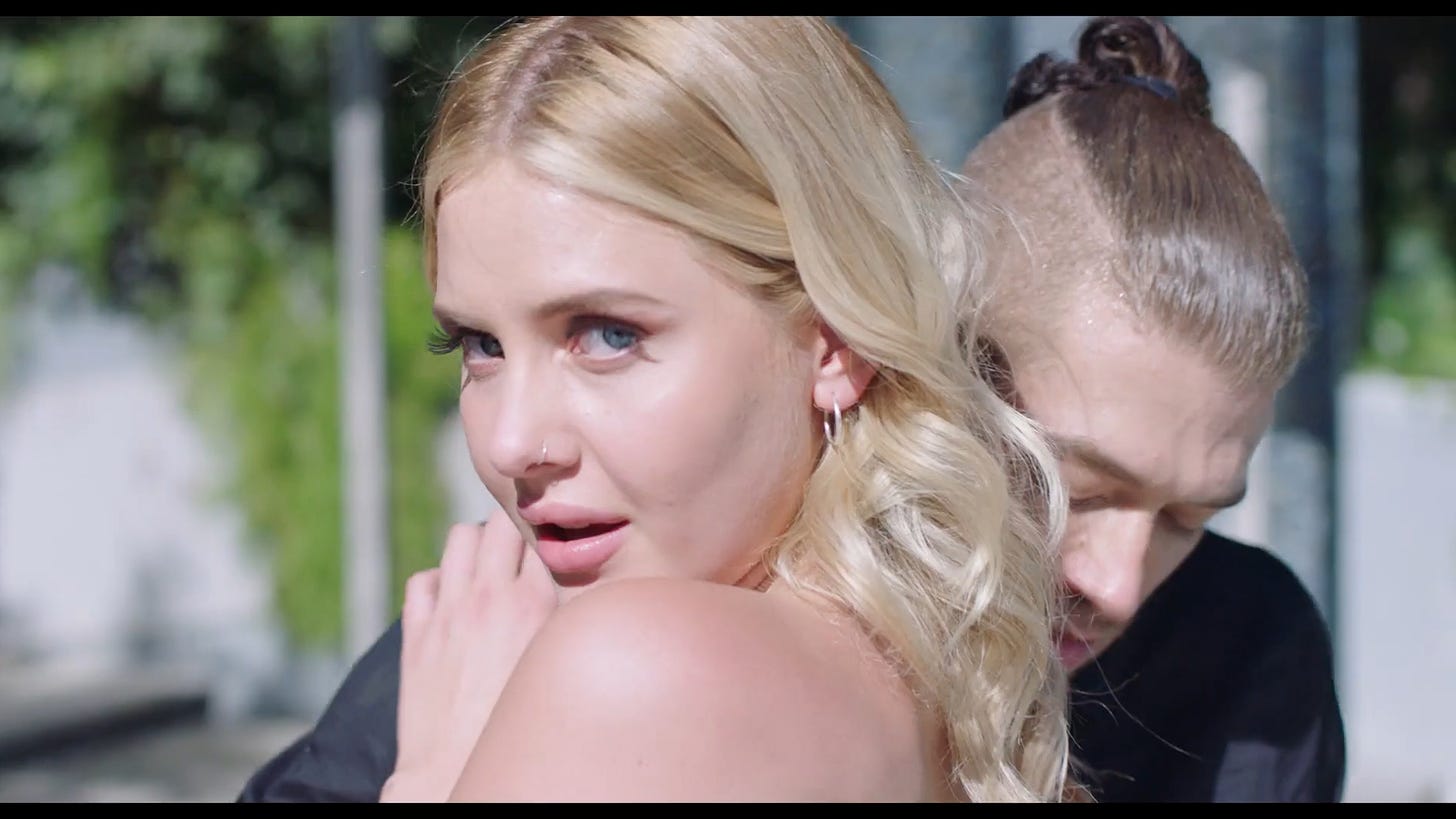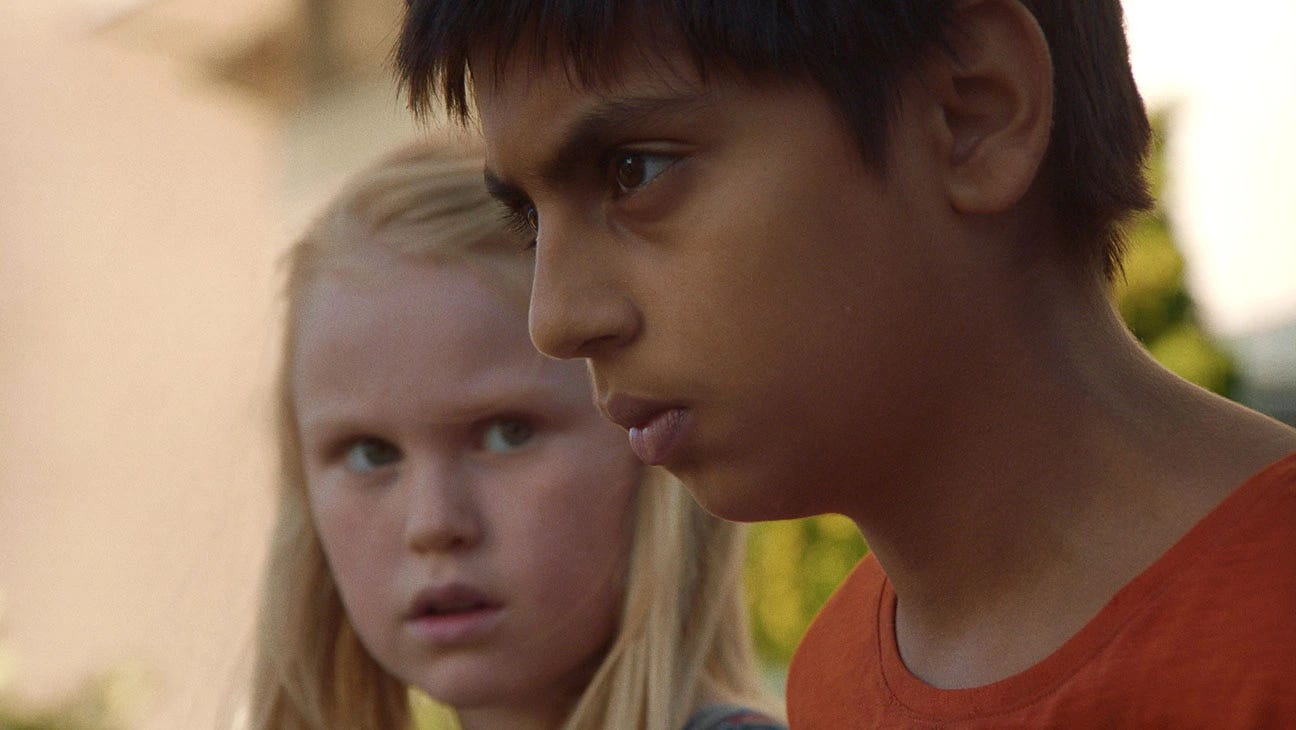In Review: 'Pleasure,' 'The Innocents'
This week, Scandinavian filmmakers offer two different journeys from something like innocence to experience: one set in the L.A. porn industry, the other in a mirthless Norwegian apartment complex.
Pleasure
Dir. Ninja Thyberg
109 min.
Cultural critics tend to date the “porno chic” period as running from 1969, when Denmark legalized pornography and Andy Warhol’s Blue Movie played theaters, to the mid-1980s, when the new technologies of the VHS era permanently shifted porn to home viewing, and changed its aesthetic in kind. In truth, the boom years of pornographic films playing mainstream theaters were much narrower, bookended by 1972’s Deep Throat and 1976’s The Opening of Misty Beethoven, a period when major newspapers accepted adds for XXX productions and the idea prevailed that straight couples could see these movies as a kind of foreplay on their evening out. Since the ’80s, there’s been little pretext that anyone other than men would watch them, and the “scenes,” such as they are, mostly cut to the chase. Narrative and surprise went away. Performers and sex acts soon were broken down into categories and subcategories, and watched more á la carte than prix fixe.
In Pleasure, her fictional-but-convincing odyssey through the present-day industry, co-writer/director Ninja Thyberg suggests that the niche-ification of porn has accelerated since the mid-’80s, but the money has dried up. When 20-year-old Linnéa (Sofia Kappel), an enigmatic blonde from Sweden, turns up for her first shoot in Los Angeles, the gig pays $900, so working up to a career as a big-name porn star is going to be a volume business. She bunks in a house with three other actresses, including Joy (Revika Anne Reustle), a zesty performer who shows her the ropes, and strikes out looking for the right agent and pathway to get where she wants to go. Once she takes stock of the scene’s unofficial hierarchy, Linnéa (porn name Bella Cherry) sets her sights on Mark Spiegler, an agent whose “Spiegler Girls” are among the most glamorous and popular models. (Spiegler, an actual porn manager, appears as himself, shockingly unaware of how poorly he comes across.)
The premise for Pleasure sounds like a porn scenario in itself: Innocent, exotic, barely legal blonde from the land of I Am Curious… Yellow takes on Van Nuys. And Thyberg gives it the gloss of an HD production, too, as Linnéa hopscotches her way through a variety of shoots, trying to figure out her place through a grueling process of trial and error. Though in no way a docudrama, Pleasure is astonishingly persuasive in its depiction of the cold technicalities of porn production—the standard forms and waiver agreements, the bathroom prep work, the blocking of scenes and collaboration between the actors. The sex scenes in Pleasure are simulated, but everything around them is casually explicit, including the nuts-and-bolts of erections and douches, or the half-naked downtime where actors compare apps on their phones.
Every shoot has a different texture to it, which is part of what makes Linnéa’s adventures so harrowing. She experiments across the spectrum, at first believing she needs to be conservative as she makes her ascension, and then deciding to push to extremes. She thinks she’s into the “rough stuff” after an S&M shoot that’s choreographed with great sensitivity, but then she’s thrown into a situation that feels unsafe, to put it mildly. Thyberg doesn’t try to fill in the motivational blanks with Linnéa, other than to reject the clichés about why young women turn to porn. Linnéa likes being in front of the camera—populating her Instagram page, an essential metric of the business, is a task she relishes—but her ambition is tangled up with a confusion about who she is and what she wants to do with her life. It’s a common occupational hazard.
Thyberg’s command over the business of pleasure weakens slightly whenever Pleasure steps out of the business. She can’t quite find a way to keep narrative obligations from imposing on the protagonist’s spontaneous, seat-of-her-pants lifestyle, so Linnéa’s friendship with Joy or her rivalry with an aloof Spiegler Girl, narrow into the same lesson about how women get turned against each other. The point is well-taken, since it’s surely to the benefit of the men who run the industry to weaken any solidarity its female sex workers might develop together. But the truer scenes in Pleasure sort through the chaos Linnéa has made of her life—a winding road with no easy exit ramps. — Scott Tobias
Pleasure opens in New York and Los Angeles on Friday and expands from there.
The Innocents
Dir. Ekil Vogt
117 min.
It’s never easy moving to a new place, especially when you’re a kid as Ida (Rakel Lenora Fløttum), the nine-year-old central character of writer/director Ekil Vogt’s The Innocents, discovers soon after arriving at her new home in the film’s opening moments. Accompanied by her autistic older sister Anna (Alva Brynsmo Ramstad), their father (Morten Svartveit), and mother (Ellen Dorrit Petersen)*, she takes up residence in an upper-floor apartment located in an unnamed Norwegian neighborhood nestled next to a forest. Part of sprawling complex, it’s been nearly emptied out by vacation season, leaving Ida to find what fun she can with the kids left behind. These include the sweet Aisha (Mina Yasmin Bremseth Asheim) and the perhaps not-so-sweet Ben (Sam Ashraf), who lacks in social skills but offers a different sort of allure for Ida when he reveals he can move objects with his mind.
But with great power sometimes comes great irresponsibility. Ben is dangerous kid, but he’s dangerous in a way that’s familiar to kids with a late- (or never-arriving) sense of right and wrong and gripped by conflicting emotions. In one scene, his idea of afternoon fun involves dropping a cat from high atop a staircase to see what happens. He seems generally alarmed that the cat may have been harmed and relieved to find it alive. Then he decides to smash the cat’s skull with his heel. (Animal lovers take note: Vogt shoots the moment from a distance but the “crunch” is excruciating.) And if that’s what a kid like that does without superpowers, what kind of havoc could he wreak with them?
At times, The Innocents plays like a science fiction twist on the stretch of Terrence Malick’s The Tree of Life when its protagonist begins to exercise his ability to sin for the first time, running roughshod through the neighborhood, abusing animals, and violating others’ privacy. The title is ironic but only up to a point. Ben’s awful but also, at times, heartbreakingly vulnerable. He is, after all, just a kid. He also reflects some of Ida’s own impulses back to her, like her urge to pinch Anna to see if she can make her cry or put broken glass in her sister’s shoes. His powers, too, are not his alone. In time, it becomes clear that others in the complex have abilities of their own.
Vogt (writer/director of Blind and the co-writer of each of Joachim Trier’s five features) borrows a title from Jack Clayton’s 1961 adaptation of The Turn of the Screw and it’s not hard to connect some dots between the two film’s themes. But he owes an even deeper debt to Theodore Sturgeon’s 1953 classic More Than Human, which considers the implications of the emergence of a new generation of superhumanly gifted beings. Working with an unusually gifted central quartet of young actors, Vogt’s restrained, patient style — interrupt by the occasional explosive burst of action — creates a sense of unease from the opening shot of Ida’s peaceful, sleeping face bouncing around during a bumpy car ride to its final image, which answers some questions about what’s come before but raises even more. Where Vogt and Trier’s The Worst Person in the World attempted to take the temperature of a generation of young adults drifting through the early decades of 21st century, The Innocents looks to the next generation and asks if the kids are all right. That it finds no answers is only appropriate. They’re kids, and in the act of becoming something we can’t yet imagine. —Keith Phipps
The Innocents is in select theaters and available via VOD on May 13th.
* And, yes, regular readers, take note: we now officially have a trend. With their characters identified only as “ Ida og Annas mor” and “ Ida og Annas par,” The Innocents joins both Hatching, Petite Maman, and Vortex in a run of recent films with unnamed parents.









"Cat harm" is the most important warning I need. Wish somebody had given me that notice before I bought tickets for Drag Me to Hell!
Keith, all you had to do to ensure I will seek out "The Innocents" this weekend was mention the debt to "More Than Human." What a great book.